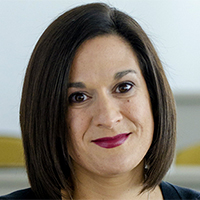What is pharmacogenomics?
Pharmacogenomics is the study of how a person's genes affect their response to medications. We know that 99% of people carry at least one genetic variant that impacts their response to certain medications. With pharmacogenomics, we can use that information to guide medication selection or figure out the right dose.
How is CU Anschutz helping to advance pharmacogenomics research?
There is so much cutting-edge research on our campus that spans many different therapeutic areas. We have people studying pharmacogenomics in cardiology, psychiatry, women’s health, transplant, emergency medicine, and other areas. There are so many talented researchers here who are asking a lot of interesting questions to advance the science in this field.
We’re also helping to improve the diversity of pharmacogenomic studies to expand the benefits of this research to a broader group of patients and populations. So we’re working to ensure there's equity in pharmacogenomic research, as well as clinical implementation.
How close are we to being able to implement a personalized approach to prescribing medications based on a patient’s genetics?
It’s happening right here, right now. CU Anschutz and UCHealth are true leaders in integrating pharmacogenomics into clinical care.
Several years ago, the Colorado Center for Personalized Medicine partnered with UCHealth to establish a biobank research study. As part of that study, UCHealth patients are asked to provide a blood or saliva sample for genetic research. Those who participate are informed that there's the potential to have clinically actionable results from their biobank sample returned to them and their electronic health record in the future. This has been a tremendous multidisciplinary team effort, bringing together folks from the university, UCHealth and industry partners, to see this come to fruition.
How can clinicians find and utilize this genetic information to inform care decisions?
With the biobank partnership, we’ve created tools that preemptively alert clinicians at the time they try to prescribe a drug to a patient who has a known drug-gene interaction. We notify UCHealth clinicians through the electronic health record, and we provide them with support tools and clinical guidance on what to do with that information. To date, we have returned pharmacogenomic results to over 4,100 biobank participants’ health records at UCHealth, and we’ve already had almost 500 drug-gene alerts in clinical practice.
What’s an example of how a drug-gene alert could change the course of treatment for a patient?
Statins are one of the most common groups of drugs for which we see gene alerts. Statins are a cholesterol-lowering medication taken by more than 30 million Americans. However, about 28% of the population carries a genetic variation that can increase their risk of having muscle-related side effects from statins. By knowing someone's genetic makeup and predisposition to side effects, you could potentially prescribe a lower dose of statin, or you could use a statin with a lower risk of muscle-related side effects. It’s not a life-threatening side effect, but it gives you different options. If a clinician can have this genetic information upfront and lower the risk of side effects, it can be very advantageous.
Last week, CU Anschutz hosted an international conference on pharmacogenomics. What were some of the greatest takeaways?
Yes, we had more than 300 people here from five continents for a meeting with the Clinical Pharmacogenetics Implementation Consortium (CPIC) and the Pharmacogenomics Global Research Network (PGRN). Together, these groups are helping to bridge the gap between pharmacogenomics research and clinical translation of discoveries.
Dr. Andrew Monte, a professor in the CU Department of Emergency Medicine and current PGRN president, spent months organizing this event with the CPIC/PGRN team, and the Colorado Center for Personalized Medicine served as the on-campus host. The meeting’s theme was diversifying pharmacogenetic science to improve implementation, and I think that highlights the strengths of our campus – both for pharmacogenomic research and integration of that research and information into clinical care.
What do you think the future of pharmacogenomics will look like?
I believe the field will shift to a more preemptive testing strategy, meaning we could someday return pharmacogenetic data to patients’ medical records well before that information is needed for prescribing – similar to what we are already doing at UCHealth. So instead of having to order tests and wait for the result when a patient needs a medication, that individual’s genetic information and drug-gene interactions would already be readily available at the point of prescribing.
In the future, we would like to continue to preemptively integrate more genetic information into more patients’ electronic health records. I think we're already doing many innovative things with UCHealth and continuing to push the envelope in terms of using the most innovative tools available. I hope that in the coming years, we’ll continue to improve the scope and sophistication of these tools within electronic health records, so we can provide the most relevant and timely information possible to more clinicians and patients.



.png)
.jpg)
